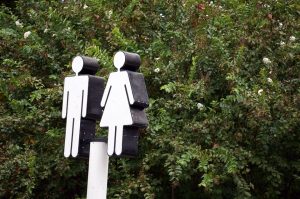
Recently in North Carolina there has been much controversy surrounding the “bathroom bill,” also known as House Bill 2 or HB2. The bill, if passed, would require that restrooms in public institutions be single gender and require that a patron’s biological sex match the restroom he or she uses. The bill goes into even more discriminatory and potentially tyrannical issues; however, I only wish to address the prominent bathroom controversy.
First and foremost, creating legislation that would regulate which bathroom a person is allowed to use is an issue of private discourse, not one of public discourse, and we should not be attempting to pass legislation on the topic. Everyone has a right to life liberty and property, and public discourse addresses the protection of these rights and nothing more, for that is the job of the legislature. That is what we entrust to our government when we enter into a society. On top of this, any new law must be consistent with those previously in place, and the legislature mustn’t contradict itself, for in doing so, it would threaten the rights of its people.
Neither of these constraints on public discourse even begins to include one’s bathroom preference. Which bathroom a person uses does not infringe upon others’ right to life, liberty, or property. There is no potential of harm. Many argue that without restraints on who can use which bathroom there is a higher chance that sexual predators will exploit the freedom to gain access to victims, but there is absolutely no evidence to support such a claim1. Without a clear and present danger to citizens’ life, liberty, or property, the government has no right to legislate the issue.
There is also no precedent for denying someone access to a public space based on biological sex. There is precedent for protection against such discrimination, but no law has been upheld that prevents a person from having access to publicly funded space due to their biology; in fact, most attempts to do so have been struck down as unconstitutional. The people of the United States have come to see such biological discrimination as rule that is beyond right and reason to legislate. This is the definition of tyranny. Legislation that is outside the Realm of Argument falls into the Realm of Force. Passing this so-called “bathroom bill” would cross a line from consensual government to unacceptable despotic government.
I have made the case that legislating public bathroom use would be tyrannical, and I would now like to argue that believing the issue of regulated bathroom use a matter of private discourse does not prevent us from legislating protections against general discrimination.
Where legislation regulating which bathroom a person is allowed to use does not protect anyone’s right to life, liberty, and property, legislation that protects against biologically based discrimination does protect these rights. In the case of the transgendered community, discrimination poses a threat to their life, liberty and property. Trans people are more likely to commit suicide, experience homeless, and experience violence related to their gender identity than their cisgender peers2. Here we see actual threat to the life, liberty, and property of a citizen. We also see precedent for anti-discrimination laws in civil rights and women’s rights. Leviticus 19:15 states, “You shall do no injustice in judgment; you shall not be partial to the poor nor defer to the great, but you are to judge your neighbor fairly.” The practice of legislating to promote equality is set. Therefore, it is within the realm of public discourse to legislate protections against discrimination, and we should do just that.
- http://www.npr.org/2016/05/15/477954537/when-a-transgender-person-uses-a-public-bathroom-who-is-at-risk
- http://www.avp.org/storage/documents/Training%20and%20TA%20Center/FORGE_Transgender_Violence_Fast_Facts.pd
- Header Photo: pixabay, free stock photo- no attribution required
